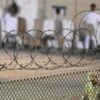
The sentencing hearing, and Khan’s two hours of graphic testimony, marked the first time that details of the C.I.A. torture program were laid bare in public.
Scott Ritter explains how the murder of Zemari Ahmadi and nine family members by a U.S. drone attack in August was whitewashed by the Pentagon.